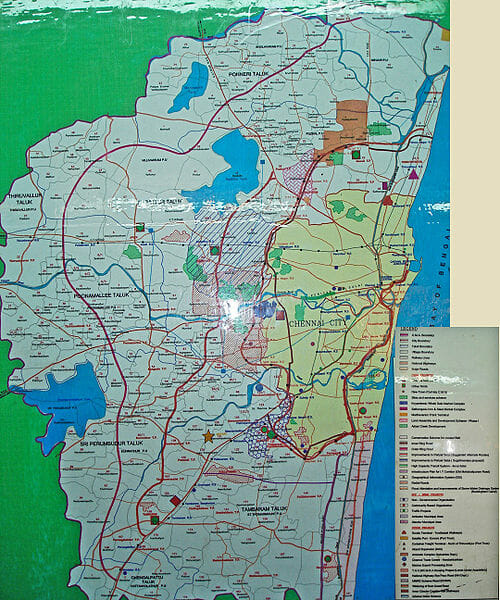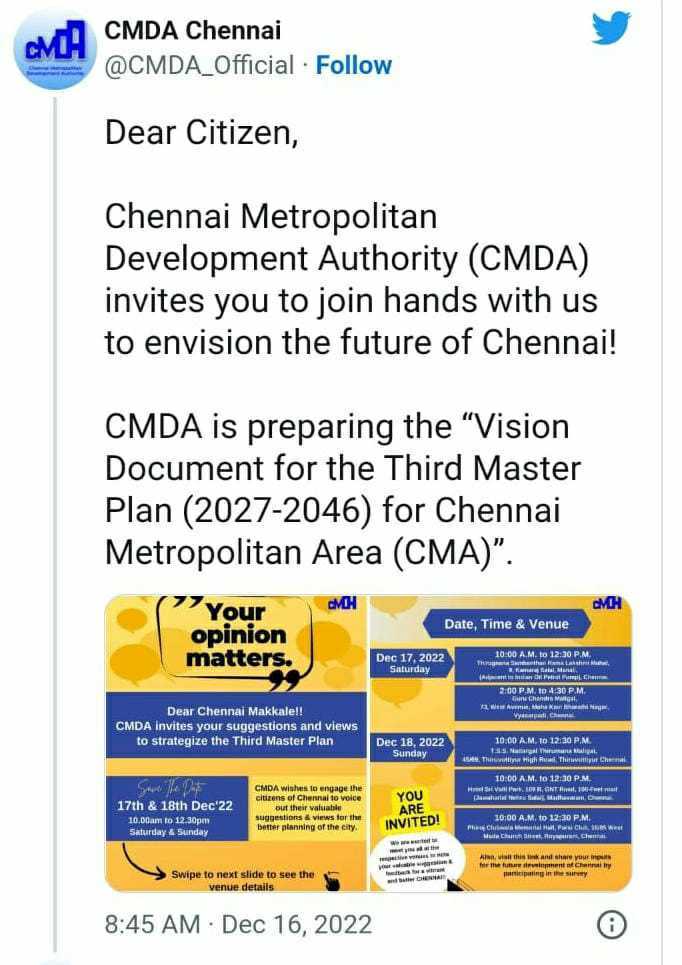The Chennai Metropolitan Development Authority (CMDA) has begun the process of holding public consultations welcoming views from residents on the draft Third Master Plan for Chennai. The consultations are meant to be a participatory exercise which provides a platform for residents to offer suggestions and share grievances.
However, my experience attending a recent consultation has revealed many gaps in the process that would prevent effective representation of the views of the residents.
Issues with CMDA’s public consultation
I attended the public consultation organised by the CMDA at Hotel Sri Valli Park in Madhavaram, Chennai. The meeting was scheduled from 10.00 am to 12.30 pm on Sunday the 18th of December 2022. I was in attendance with Nagarjunan, the General Secretary of the Alliance of Residents Welfare Associations (AoRWA).
We reached the venue well in time and were welcomed by some young students. When we inquired if there were any CMDA officials in the venue, we were informed that they were on the way and would reach by 10.30 am. We were asked to make an entry in the visitors’ register and a survey form was provided for us to fill up.
The meeting was being held in a tent which was set up in the car park behind the hotel. While the tables, chairs, a pedestal fan, and a screen with a projector were in place in front of a dais, there was no lighting arrangement within the tent.
We filled out the survey form and included some suggestions on maps presented by the students relating to Zone 3, where we reside. We had to wait for some more time before the dais was occupied by the Chairman of Zone 3 and a few other members of the legislative council from the ruling party and the opposition.
Around 10.50 am the meeting finally commenced with the Tamizh Thai Vazhthu followed by the Chairman’s address. The residents were later called upon offer their suggestions.
Nagarjunan was the first person to set the ball rolling. He started off by highlighting the delays in implementing the CMDA’s Second Master Plan effectively.
He raised issues faced by residents related to the widening of roads, quality of road surface, encroachments, lack of properly designed intersections, poor sewage and stormwater drain connections, and absence of proper planning and coordination between various government agencies.
A few minutes after he started speaking, he was urged by a CMDA official to end his speech due to a shortage of time.
Nagarjunan is an octogenarian who had driven all the way from Anna Nagar to Madhavaram only to share his honest opinion on the state of affairs in the city. In addition to this, he was to also share the suggestions put together during the 9th National Conference of the Confederation of Residents Welfare Associations, Chennai (CoRWA) held in November 2022. These suggestions emerged from consultations that saw the participation of a large number of RWAs from across the city.
Nagarjunan spoke only on policy issues and decided to hold his ground and continued sharing his views.
Read more: Illegal construction in Chennai: Where are the rules and whom can one report to?
Role of CMDA officials in public consultations
The interactive session which was originally planned for two and a half hours had to be completed in just over an hour due to the delay in starting the session. To our disappointment, most of the other speakers chose to address issues of personal interest instead of focussing on policy issues that are faced by Chennai. At one stage, the officials decided to fix a time limit of one to two minutes for the speakers due to the paucity of time.
The political representatives who had taken the centre stage intervened on several occasions. Most of the time, they chose to fix the responsibility on the people. We could not help but feel that the purpose of the meeting would have been better served if the senior officials of the CMDA had helmed the interaction and allayed the concerns of the speakers.
Going forward, it would be helpful if the CMDA chalked out a clear agenda for the meeting and solicited specific views purely on policy matters from residents.
The representatives of CMDA are the only competent persons to conduct or preside over such meetings and solicit/reply to the submissions being made. Unfortunately, the meeting held in Madhavaram was political in nature and the residents who had taken the time to attend the session were left feeling that the exercise was an eyewash.
Read more: Why public consultations in Chennai often fail to capture the real concerns of citizens
Some suggestions for CMDA on the Third Master Plan
While we were able to present some of our concerns at the meeting, we plan on sharing them with the CMDA through email and social media. Some of the broad issues that must be addressed in the upcoming CMDA Master Plan are as follows:
- CMDA must prioritise incomplete and pending items from the Second Master Plan. There were several roads which were identified for widening, which is yet to be completed. This must be carried out prior to the implementation phase of CMDA’s Third Master Plan.
- Many builders have chosen to convert the stilt parking spaces within buildings into commercial outlets after obtaining the requisite permissions and licences. The nexus between the officials, commercial establishments and politicians and their corrupt practices is no hidden secret. It would be of great help if a routine monitoring mechanism can be put in place to curb this menace as a policy decision as this move has caused grave inconvenience to residents.
- Commercial activities within residential communities must be banned. Several commercial establishments have come up in areas which were once demarcated as residential neighbourhoods. Automobile service centres, fast food restaurants and other shops operating in residential lanes and have resorted to usurping any open space available.
- Local residents have to be taken into confidence before taking up any development work within the neighbourhoods. Many have been left wondering how the licences for operating commercial establishments within residential areas are being issued without any consultations with the Resident’s Welfare Associations. CMDA and other government agencies must work closely with the local residents on such issues of public interest.
- On-street parking has become a matter of serious concern, with either side of the narrow roads within the residential areas being usurped for illegal parking. Even the arterial bus route roads are not being spared. On-street parking must be regulated by fixing a fee which is much higher than the cost of parking a vehicle within a private property.
- Robust policy and enforcement mechanisms must be put in place for the removal of all the encroachments on the roads and footpaths. All obstructions caused by eateries, commercial establishments operating out of public spaces, EB & telephone distribution pillars, transformers, footsteps or ramps constructed on the roads or footpaths must be removed on war footing.
- The work related to all underground services must be completed before laying or resurfacing of roads. Lack of proper coordination between the various government agencies results in constant digging of roads after it is resurfaced. CMDA must put in place a coordination mechanism to ensure roads are not damaged once it is resurfaced.
- During the drought years, most of the residents depend on groundwater for all their needs. CMDA must not grant permissions for the construction of buildings in catchment areas, wetlands and water bodies in order to preserve the city’s natural resources.
- There are several slums in the immediate neighbourhoods of very well-developed residential colonies. Any development happening across the city needs to be uniform in nature. CMDA must look into the redevelopment of slums in the city similar to efforts in cities like Mumbai.
- Prior to granting permissions for high-rise buildings, malls, theatres and gated communities, CMDA must ensure that all the basic civic infrastructure is in place. The existing sewage pipelines, stormwater drains and roads must be upgraded with a view to accommodate any increase in load to be borne by them.
- While a lot has been said about the formation of CUMTA, the pace at which decisions are being made is less than desirable. We would like to see the unification of transport systems in the next two to three years to ease traffic congestion and reduce pollution in the city.

Members of civic engagement groups across the city have been closely engaging with the officials from the local administration and other enforcement agencies to improve the quality of life in Chennai. We have been recording every experience of ours both good and bad with a specific purpose. There are several long-pending issues of public interest which are yet to be addressed.
While our demands are accepted in principle in most cases, we do not get to see any change in the situation on the ground. At best, we are offered temporary relief to long-term issues that plague the city.
The hope is that the CMDA’s Third Master Plan can address such concerns. For this to happen, the voice of the residents must be taken into account right at the stage of the formulation of the plan. CMDA must step in to address the concerns around public consultations and open up more avenues for residents to be heard on pressing issues.

Good compilation of public concern